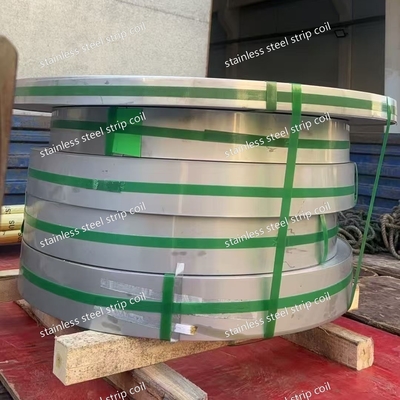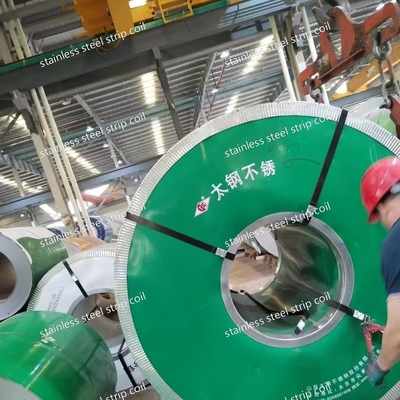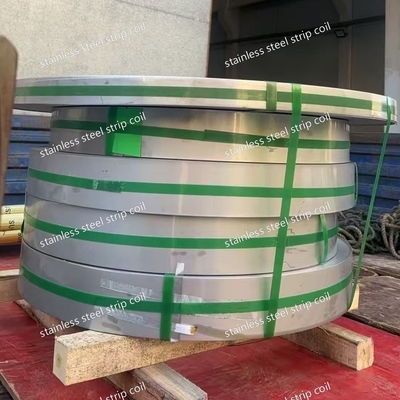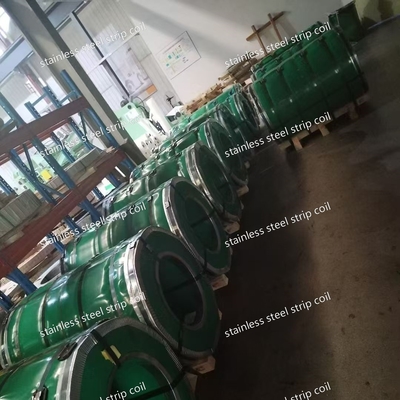All Products
-
 Raian IonescuMaterial quality very good. we have cooperate more than 10 Years. They trade lots kinds of steel material. All material quality good. They duty for all material quality. We are planing continue cooperate with them in the future
Raian IonescuMaterial quality very good. we have cooperate more than 10 Years. They trade lots kinds of steel material. All material quality good. They duty for all material quality. We are planing continue cooperate with them in the future
Stainless Steel Strip Coil Alloy SUS304 SUS316L SUS321 SUS430 Narrow SS Strips Width 5 - 50mm
| Place of Origin | China |
|---|---|
| Brand Name | TISCO |
| Certification | ISO |
| Model Number | 300 Series / 400 Series |
| Minimum Order Quantity | 2 Ton |
| Price | 1500-2500 USD/Ton |
| Packaging Details | standard packing for export |
| Delivery Time | 5 - 12 days based on the quantity |
| Payment Terms | L/C, T/T, Western Union |
| Supply Ability | 20Ton per week |
Product Details
| Products | Stainless Steel Strip | Thickness | 0.5-3.0mm |
|---|---|---|---|
| Width | Within 1500mm | MOQ | 500 Kgs |
| Grade | 200 Series 300 Series 300 Series | Surface | BA 2B NO.4 HL 8K NO.1 |
| Standard | ASTM EN GB JIS | Packing | Wooden Frame And Water Proof Paper |
| Highlight | Stainless Steel Strip Coil 304,Stainless Steel Strip Coil 316L |
||
Product Description
Stainless Steel Strip Coil Alloy SUS304 SUS316L SUS321 SUS430 Narrow SS Strips Width 5 - 50mm
Products Specification
| Product Name | Stainless Steel Strips |
| Length | As required |
| Width | 3mm-1219mm or as required |
| Thickness | 0.15 - 3.0mm or as required |
| Standard | AISI,ASTM,DIN,JIS,GB,JIS,SUS,EN,etc. |
| Technique | Hot rolled / cold rolled |
| Surface Treatment | 2B or according to customer requirement |
| Thickness tolerance | ±0.01mm |
| Material | 201, 202, 301, 302, 303, 304, 304L, 304H, 310S, 316, 316L, 317L, 321,310S 309S, 410, 410S,420, 430, 431,434, 440A,904L,2205,2507 |
| Application | It is widely used in high temperature applications, medical devices, building materials, chemistry, food industry, agriculture, ship components.It also applies to food, beverage packaging, kitchen supplies, trains, aircraft, conveyor belts, vehicles, bolts, nuts, springs, and screen. |
| MOQ | 1tons.We also can accept sample order. |
| Shipment time | Within 15-20 workdays after receiving deposit or L/C |
| Export packing | Waterproof paper, and steel strip packed.Standard Export Seaworthy Package.Suit for all kinds of transport,or as required |
| Capacity | 250,000 tons/year |
Stainless steel strip is a versatile and widely used form of stainless steel, characterized by its thin, flat structure and exceptional mechanical and chemical properties. It is produced through a series of precision manufacturing processes, making it suitable for diverse applications across industries ranging from automotive to electronics, construction to medical devices.
What is Stainless Steel Strip?
Stainless steel strip, also known as stainless steel ribbon, is a rolled metal product with a width typically ranging from a few millimeters to several hundred millimeters, and a thickness as thin as 0.01mm up to around 3mm. Its defining feature is the presence of chromium (at least 10.5% by weight), which forms a passive oxide layer on the surface, providing excellent corrosion resistance. This oxide layer self-heals when damaged, ensuring long-term durability even in harsh environments.
Manufacturing Process
The production of stainless steel strip involves several key steps to ensure precision and quality:
- Melting and Casting: Raw materials such as iron ore, chromium, nickel, and other alloying elements are melted in electric arc furnaces. The molten metal is then cast into slabs or billets.
- Hot Rolling: The slabs are heated and rolled into thinner sheets called "hot-rolled coils," reducing thickness while improving mechanical properties.
- Cold Rolling: Hot-rolled coils undergo cold rolling to achieve the desired thickness, surface finish, and dimensional accuracy. This process also enhances strength and hardness.
- Annealing: After cold rolling, the strip is annealed in a controlled atmosphere to relieve internal stresses and restore ductility. Annealing temperatures typically range from 800°C to 1100°C, depending on the stainless steel grade.
- Surface Treatment: Various surface finishes are applied, including 2B (matte), BA (bright annealed), and polished, to meet specific application requirements.
- Slitting and Cutting: The final coils are slit into strips of precise widths using advanced slitting machines, ensuring tight tolerances.
Types and Grades
Stainless steel strips are classified based on their crystalline structure, with the most common types being:
- Austenitic: The most widely used type, containing high levels of chromium and nickel (e.g., 304, 316). These strips offer excellent corrosion resistance, formability, and weldability, making them ideal for food processing, chemical equipment, and decorative applications.
- Ferritic: Contains chromium but little or no nickel (e.g., 430). They are magnetic, cost-effective, and suitable for applications like automotive trim and kitchen appliances.
- Martensitic: Hardenable by heat treatment, with high strength and wear resistance (e.g., 410). Used in cutlery, valves, and mechanical components.
- Duplex: Combines austenitic and ferritic structures (e.g., 2205), offering high strength and corrosion resistance for oil and gas, marine, and structural applications.
Key Properties
Stainless steel strip boasts a unique set of properties that make it indispensable in various industries:
- Corrosion Resistance: The chromium oxide layer protects against rust and chemical attack, even in humid, acidic, or salty environments.
- Strength and Durability: Cold rolling enhances tensile strength, allowing the strip to withstand mechanical stress and heavy loads.
- Heat Resistance: High-temperature grades (e.g., 310) retain their properties at temperatures exceeding 800°C, suitable for furnace parts and exhaust systems.
- Formability: Easily bent, stamped, or welded into complex shapes without compromising integrity, enabling versatile design applications.
- Hygiene: Non-porous surface prevents bacterial growth, making it ideal for medical equipment, food processing, and pharmaceutical machinery.
Applications
The versatility of stainless steel strip is reflected in its wide range of applications:
- Automotive Industry: Used in exhaust systems, fuel lines, and decorative trim due to heat and corrosion resistance.
- Electronics: Precision strips serve as connectors, battery components, and shielding in smartphones, computers, and electrical devices.
- Medical Devices: Biocompatible grades (e.g., 316L) are used in surgical instruments, implants, and diagnostic equipment.
- Construction: Applied in roofing, cladding, and structural components for its durability and aesthetic appeal.
- Household Goods: Found in kitchen utensils, appliances, and hardware for its hygiene and sleek finish.
Advantages Over Other Materials
Compared to carbon steel, aluminum, or plastic, stainless steel strip offers distinct advantages:
- Longer service life due to corrosion resistance, reducing replacement costs.
- Higher strength-to-weight ratio, enabling lightweight yet robust designs.
- Recyclability: Over 90% of stainless steel is recyclable, making it an eco-friendly choice.
- Low maintenance: Requires minimal cleaning and upkeep, even in demanding environments.
![]()
![]()
![]()
![]()
Recommended Products










